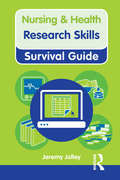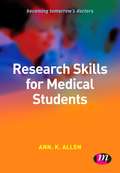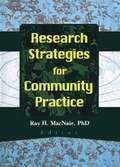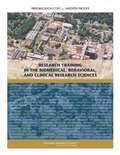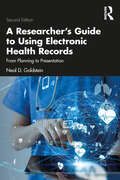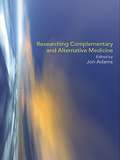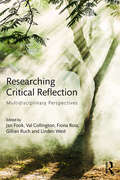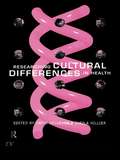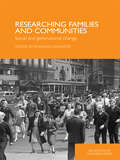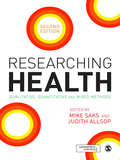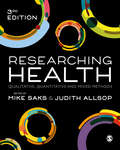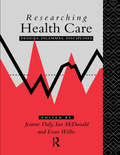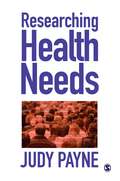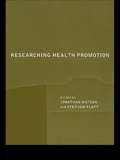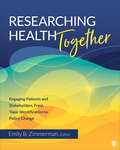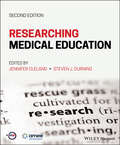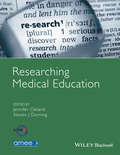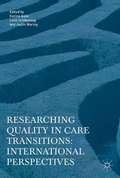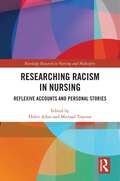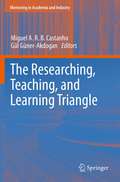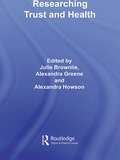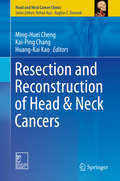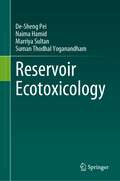- Table View
- List View
Research Skills (Nursing and Health Survival Guides)
by Jeremy JolleyDo you need to conduct or understand research to support your studies or evidence-based practice in healthcare? Ensure that you have all the research tools at your finger tips with this quick reference guide covering both quantitative and qualitative research.
Research Skills for Medical Students (Becoming Tomorrow's Doctors Series)
by Judy Mckimm Kirsty Forrest Ann K. AllenThe revised Tomorrow's Doctors makes it clear that doctors need to be aware on their responsibilities as a scholar and scientist and it is therefore vital that students develop excellent critical thinking and research skills. While there are many 'research skills' books, medical students frequently struggle with understanding the difference between the practices of research, audit, service evaluation, systematic and narrative reviews and when and how to apply them. This book addresses the kinds of questions novice investigators always ask and helps students utilize study designs, data collection tools and analyze effectively.
Research Strategies for Community Practice
by Ray H MacnairIn Research Strategies for Community Practice, you’ll discover how you can more effectively work together with other practitioners and researchers in the interests of knowledge development and practice assessment. You’ll also gain access to the conceptual rationale, research design process, and research utilization process necessary for success in the context of community organizing.Research Strategies for Community Practice raises crucial issues for you and other community practitioners. In chapters on historical research strategies, you’ll discover the need for reform in research procedures, which will aid you in setting goals, establishing political agendas, and exploring new policy directions. In the chapters covering community network analysis, you’ll find human service and support systems. Specifically, your understanding of this vital area of community practice will develop and flourish in these and many other important areas: uses of historical research assessment, planning, and evaluation through network analysis single system research design the research process in community-based empowerment systems collaborative research participants in the context of adolescent healthReaders from all backgrounds, including doctoral students in social work, sociology, and public administration who have an interest in community practice, will want to take a look inside the proven techniques and sound research in Research Strategies for Community Practice. You’ll find a practical community of professional researchers and practitioners who have compiled the most successful strategies for conducting and bettering research in your community practice.
Research Training in the Biomedical, Behavioral, and Clinical Research Sciences
by National Research Council of the National AcademiesComprehensive research and a highly trained workforce are essential for the improvement of health and health care both nationally and internationally. Over the past 40 years the National Research Services Award (NRSA) Program has played a large role in training the workforce responsible for dramatic advances in the understanding of various diseases and new insights that have led to more effective and targeted therapies. In spite of this program, the difficulty obtaining jobs after the postdoc period has discouraged many domestic students from pursuing graduate postdoc training. In the United States, more than 50 percent of the postdoc workforce is made up of individuals who obtained their Ph.D.s from other countries. Indeed, one can make a strong argument that the influx of highly trained and creative foreigners has contributed greatly to U.S. science over the past 70 years. Research Training in the Biomedical, Behavioral, and Clinical Research Sciences discusses a number of important issues, including: the job prospects for postdocs completing their training; questions about the continued supply of international postdocs in an increasingly competitive world; the need for equal, excellent training for all graduate students who receive NIH funding; and the need to increase the diversity of trainees. The book recommends improvements in minority recruiting, more rigorous and extensive training in the responsible conduct of research and ethics, increased emphasis on career development, more attention to outcomes, and the requirement for incorporating more quantitative thinking in the biomedical curriculum.
A Researcher's Guide to Using Electronic Health Records: From Planning to Presentation
by Neal D. GoldsteinIn an age when electronic health records (EHRs) are an increasingly important source of data, this essential textbook provides both practical and theoretical guidance to researchers conducting epidemiological or clinical analysis through EHRs. Split into three parts, the book covers the research journey from start to finish. Part 1 focuses on the challenges inherent when working with EHRs, from access to data management, and raising issues such as completeness and accuracy which impact the validity of any research project. Part 2 examines the core research process itself, with chapters on research design, sampling, and analysis, as well as emerging methodological techniques. Part 3 demonstrates how EHR research can be made meaningful, from presentation to publication, and includes how findings can be applied to real-world issues of public health. Supported by case studies throughout, and applicable across a range of research software programs (including R, SPSS, and SAS), this is the ideal text for students and researchers engaging with EHRs across epidemiological and clinical research.
Researching Complementary and Alternative Medicine
by Jon AdamsResearching Complementary and Alternative Medicine provides a valuable and timely resource for those looking to understand, initiate and expand CAM research. This collection brings together leading international CAM researchers with backgrounds and expertise in a variety of areas including health social science, qualitative methodology, general practice, health services research and public health. Drawing upon their own research work and experience, the contributors explain and review core methods and research issues pertinent to contemporary CAM and its future development. Topics discussed include: the use and limitation of evidence in CAM research the issues facing practitioners (GPs, therapists, nurses, etc) who wish to conduct research how and why qualitative methods should be combined alongside quantitative methods to help explore CAM how the randomised control trial (RCT) method relates to CAM the future direction of CAM research in terms of public health and policy-related agendas. Researching Complementary and Alternative Medicine is essential reading for students, academics and researchers in CAM, health studies, medicine, nursing, medical sociology and public health. It will also appeal to CAM and allied health practitioners.
Researching Critical Reflection: Multidisciplinary Perspectives
by Jan Fook Gillian Ruch Fiona Ross Val Collington Linden WestCritical reflection helps professionals to learn directly from their practice experience, so that they can improve their own work in an ongoing and flexible way – something essential in today’s complex and changing organisations. It allows change to be managed in a way which enables individuals to preserve a sense of what is fundamentally important to them as professionals. It is particularly important as it can also help make sense of some fundamental issues, and so also has implications for how we live our lives. However, more systematic research on critical reflection is needed to help us understand what works best for professionals in different settings. This timely work explores how critical reflection is researched, evaluated and used as a research method itself, with the aim of improving how it is taught and practised in a rigorous and transferable way. Developing a more comprehensive and multi-disciplinary view of the current state of critical reflection and the research directions which need to be taken, the book is divided into four parts. It: - Provides an overview of different perspectives on critical reflection and stimulates dialogue between them - Establishes some common platforms from which to develop further research directions - Identifies the major issues in evaluating critical reflection teaching, and main methods for doing so - Contributes to social science methodological innovations by exploring how methods based on critical reflection can be used for researching professional practice - Contains contributions from academics who are internationally known and highly experienced in different aspects of critical reflection. Researching Critical Reflection is an important reference for all students, practitioners, and researchers – including in the areas of education, management, health and social work – who engage with critical reflection to develop their practice.
Researching Cultural Differences in Health
by David Kelleher Sheila HillierSignificant concerns about the poor health and prevalence of chronic illness amongst a number of ethnic minority populations have led to heightened debates about how best to improve the situation. For some the answer is to see their experiences as part of the general social class inequality in health, but recent evidence questions the extent to which social class can explain the variations in health which ethnic minorities experience. Researching the Cultural Differences in Health offers a range of accounts of how people in ethnic minority groups perceive and manage their illness. Some of the chapters focus on Bangladeshi, and other South Asian groups, as well as Afro-Caribbeans and Irish people. The illness conditions discussed include diabetes, hypertension, sickle-cell disorder, mental illness and coronary heart disease. This book will provide invaluable reading for those involved in providing health services for ethnic minorities, and all lecturers and students in medical and nursing education as well as those studying sociology and social administration.
Researching Families and Communities: Social and Generational Change (Relationships and Resources)
by Rosalind EdwardsRecent years have seen a concern with how family and community relationships have changed across the generations, whether for better or worse, and particularly how they have been affected by social and economic developments. But how can we think about and research the nature of the present in relation to the past and vice versa? Researching Families and Communities: Social and Generational Change explores the concepts and perspectives that guide research and the methods used to explore change during the last half of the twentieth century and into the new millennium. It highlights the complexities of continuities alongside change, the importance of the perspectives that shape investigation, and the need to engage with situated data. This edited text includes contributions from experts in their field who: address these overarching trends explore the possibilities and practice of secondary analysis or replication studies, as well as longitudinal large scale data sets discuss varied aspects of family and community life, including sexuality, ethnicity, parenting resources, older people, intergenerational family life, solo living and many others. This book will appeal to academics and students interested in family and community across a range of social science disciplines, and to those in the social research field.
Researching Health: Qualitative, Quantitative and Mixed Methods (2nd Edition)
by Professor Mike Saks Professor Judith AllsopThe second edition of Researching Health covers everything that a student or new researcher will need when starting to conduct their own research in a range of healthcare settings. The chapters guide the reader through each specific qualitative, quantitative and mixed method, and show how these work in practice. In the second edition, the authors place particular focus on the critical appraisal of research - asking not only how different forms of research can be conducted, but also how we can use the research of others effectively. Two new chapters have also been included, on: - Gender and Health Research - Public Health Research A full companion website accompanies the book, with a range of teaching materials for lecturers and online learning resources for students. It is an ideal companion for undergraduate and postgraduate students on health programmes. The book is also valuable reading for researchers, academics, managers and practitioners working across the healthcare field.
Researching Health: Qualitative, Quantitative and Mixed Methods
by Professor Mike Saks Professor Judith AllsopSaks and Allsop's Researching Health offers a comprehensive introduction to research methods for healthcare students. The new third edition includes important theoretical updates, and further international content, with contributors covering a number of specialisms and providing perspectives on core topics from the UK, Italy, Japan, New Zealand, Portugal, Canada, and Spain. There are 6 NEW chapters on: Principles of Health Research Methods of Sampling in Qualitative Health Research Qualitative Data Analysis and Health Research Researching Health Care Management Using Secondary Data Online Research in Health Disseminating and Evaluating Health Research The book is supported by case studies, end-of-chapter exercises, annotated further reading, and access to online resources for both students and lecturers, consisting of SAGE journal articles, web links, PowerPoint slides, and teaching notes for each chapter.
Researching Health: Qualitative, Quantitative and Mixed Methods
by Professor Mike Saks Professor Judith AllsopSaks and Allsop's Researching Health offers a comprehensive introduction to research methods for healthcare students. The new third edition includes important theoretical updates, and further international content, with contributors covering a number of specialisms and providing perspectives on core topics from the UK, Italy, Japan, New Zealand, Portugal, Canada, and Spain. There are 6 NEW chapters on: Principles of Health Research Methods of Sampling in Qualitative Health Research Qualitative Data Analysis and Health Research Researching Health Care Management Using Secondary Data Online Research in Health Disseminating and Evaluating Health Research The book is supported by case studies, end-of-chapter exercises, annotated further reading, and access to online resources for both students and lecturers, consisting of SAGE journal articles, web links, PowerPoint slides, and teaching notes for each chapter.
Researching Health Care
by Jeanne Daly Ian McDonald Evan WillisFirst Published in 1992. Health care is currently under intense pressure both to be cost-effective and to deliver a service its users want. This text is an important contribution to the debate about the most appropriate research method for evaluating its effectiveness.
Researching Health Needs: A Community-Based Approach
by Judy Payne`[It is] difficult to find a single volume that addresses the specific range of methodological challenges [in] health needs assessment... Judy Payne's book is a very welcome answer to this problem. [This book] offers a lucid d logical exposition of the research process. It begins with a short introduction to the relevant policy context and a clarification of the terms `health', `need' and `community'. The following chapters cover the planning stage of a project... The book then moves on to the empirical stage of research... The volume concludes with a number of short case studies... It uses research terminology judiciously, providing clear explanations and illustrations. A useful selection of references to additional texts is also given. [T]he identification of a range of typical problems associated with the interpretation of official statistics will help would-be investigators to avoid drawing wrong conclusions about the health status of different groups. There is a useful and succinct description of a number of deprivation indices, together with relevant references. The sections on sampling strategies and the analysis of statistical data are particularly good in terms of coverage, clarity and explanation of technical terms. [As an all round `use-friendly' text, the book achieves its aim admirably. It presents a clear guide while at the same time conveying the challenges and possible pitfalls inherent in investigative research work. This book provides an invaluable resource for anyone planning to undertake needs assessment in the fields of health, community or social care. It also offers an excellent basic text on health and social research for undergraduate and postgraduate students' - Sociology 'The overall style and presentation of the book is good with useful figures, chapter summaries, self-assessment exercises and case studies. The book is well-organised with logical progression through the stages of health related social research. Complex issues are described with clarity and explored in relation to actual examples that should enhance their accessibility for inexperienced researchers. The style of the book lends itself to use as a reference book and this allows it to be used over an extended time period by individuals, as their interest or experience grows' - Physiotherapy Researching Health Needs is an easy to use introductory guide to the main social research techniques used to gather evidence about the health needs of local communities. The reader is taken through the process of producing evidence, from the initial planning stages of research, to writing up, getting the message across, and trying to influence policy and practice. All of the methods are described in a simple and, as far as possible, non-technical way, and are extensively illustrated with concrete examples from existing studies. The author has adopted a comprehensive, and at times imaginative, approach to applied social research. Key features of the text include: coverage of both social survey methods and qualitative approaches; review of methods for investigating health status and community profiling, along with longitudinal and evaluative studies; a selection on using the Internet to access information, with details of relevant international and UKwebsites; inclusion of visual techniques for collecting data, along with guidelines for incorporating these into mixed-methods studies; extensive use of case studies; and practical exercises at the end of each methods chapter.
Researching Health Promotion
by Jonathan Watson Stephen PlattProviding a critical review of the current state of health promotion research. This book re-conceptualises the field of health promotion as collaborative and integrating enterprise, rather than as a battlefield for disciplinary and intellectual clashes. It makes a significant contribution to ongoing epistemological, theoretical and methodological debates in health promotion research. With contributors from Sweden, Switzerland, Denmark, Ireland, the UK and the US, Researching Health Promotion will be of interest to students and professionals working in health promotion, public health, medicine and health policy.
Researching Health Together: Engaging Patients and Stakeholders, From Topic Identification to Policy Change
by Emily B. ZimmermanThe challenges of addressing health disparities, the ethical imperative to include stakeholders in research, and the slow translation of research evidence into practice are all driving a movement towards more community-based and participatory approaches to research. Researching Health Together brings together authors who have produced innovative methods or implemented projects focused on different stages of the research process, from question development to evaluation and translation. Editor Emily B. Zimmerman gathers exemplary new methods and projects into one place for the benefit of students designing research projects and proposals, those learning stakeholder-engaged methods, and those involved in implementing and funding stakeholder-engaged projects. Each chapter addresses: how engagement was conceptualized, organized, and implemented; how engagement was evaluated; impacts on processes and outcomes of the project; and facilitators, barriers, and lessons learned. The book serves as a core textbook for courses in community-based health research at the graduate level.
Researching Health Together: Engaging Patients and Stakeholders, From Topic Identification to Policy Change
by Emily B. ZimmermanThe challenges of addressing health disparities, the ethical imperative to include stakeholders in research, and the slow translation of research evidence into practice are all driving a movement towards more community-based and participatory approaches to research. Researching Health Together brings together authors who have produced innovative methods or implemented projects focused on different stages of the research process, from question development to evaluation and translation. Editor Emily B. Zimmerman gathers exemplary new methods and projects into one place for the benefit of students designing research projects and proposals, those learning stakeholder-engaged methods, and those involved in implementing and funding stakeholder-engaged projects. Each chapter addresses: how engagement was conceptualized, organized, and implemented; how engagement was evaluated; impacts on processes and outcomes of the project; and facilitators, barriers, and lessons learned. The book serves as a core textbook for courses in community-based health research at the graduate level.
Researching Medical Education
by Jennifer Cleland Steven J. DurningRESEARCHING MEDICAL EDUCATION Researching Medical Education is an authoritative guide to excellence in educational research within the healthcare professions presented by the Association for the Study of Medical Education and AMEE. This text provides readers with key foundational knowledge, while introducing a range of theories and how to use them, illustrating a diversity of methods and their use, and giving guidance on practical researcher development. By linking theory, design, and methods across the spectrum of health professions education research, the text supports the improvement of quality, capacity building, and knowledge generation. Researching Medical Education includes contributions from experts and emerging researchers from five continents. The text includes information on: Developing yourself and your practice as a health professions education researcher Methods and methodologies including ethnography/digital ethnography, visual methods, critical discourse analysis, functional and corpus linguistics, critical pedagogy, critical race theory and participatory action research, and educational neuroscience methods Theories including those where relationships between context, environment, people and things matter (e.g., complexity theory, activity theory, sociomateriality, social cognitive theories and participatory practice) and those which are more individually focused (e.g., health behaviour theories, emotions in learning, instructional design, cognitive load theory and deliberate practice) Includes 10 brand new chapters Researching Medical Education is the ideal resource for anyone researching health professions education, from medical school to postgraduate training to continuing professional development. “This is an extraordinary text that combines theory and practice in medical education research. The authors represent the who’s who of medical education research, and their wisdom and insights will help guide novice and experienced researchers alike.” —David M. Irby, Professor Emeritus of Medicine, University of California, San Francisco, USA “Research in health professions education is maturing. This is clearly evidenced by the second edition of Researching Medical Education. In 30 chapters this book takes you on an exciting voyage on research theories and research methodologies. This book is a comprehensive resource for anyone engaging in research in health professions education.” — Cees van der Vleuten, former Director of the School of Health Professions Education, Maastricht University, The Netherlands
Researching Medical Education
by Steven J. Durning Jennifer ClelandResearching Medical Education is an authoritative guide to excellence in educational research in the health professions. <P><P>Presented by the Association for the Study of Medical Education and the Association for Medical Education in Europe, Researching Medical Education includes contributions from a team of international clinicians and non-clinical researchers in health education, representing a range of disciplines and backgrounds. This accessible reference provides readers with the basic building blocks of research, introduces a range of theories and how to use them, illustrates a diversity of methods and their use, and gives guidance on practical researcher development. By linking theory and design and methods across the health profession education research spectrum, this book supports the improvement of quality, capacity building and knowledge generation. Researching Medical Education is the ideal resource for anyone researching health education, from undergraduate, through postgraduate training, to continuing professional development.
Researching Quality in Care Transitions
by Justin Waring Karina Aase Lene SchibevaagThis book is concerned with the complexities of achieving quality in care transitions. The organization and accomplishment of high quality care transitions relies upon the coordination of multiple professionals, working within and across multiple care processes, settings and organizations, each with their own distinct ways of working, profile of resources, and modes of organizing. In short, care transitions might easily be regarded as complex activities that take place within complex systems, which can make accomplishing high quality care challenging. As a subject of enquiry, care transitions are approached from many research, improvement and policy perspectives: from group psychology and human factors to social and political theory; from applied process re-engineering projects to exploratory ethnographic studies; from large-scale policy innovations to local improvements initiatives. This collection will provide a unique cross-disciplinary and multi-level analysis, where each chapter presents a particular depth of insight and analysis, and together offer a holistic and detail understand of care transitions.
Researching Racism in Nursing: Reflexive Accounts and Personal Stories (Routledge Research in Nursing and Midwifery)
by Helen Allan Michael TraynorResearch shows that racism affects the working lives of nurses and nurse academics, as well as healthcare service delivery and outcomes. This book looks at the impact of racism, from experiences of microaggression to discrimination and structural and institutionalised racism. Focusing on the work of five researchers and practitioners who have chosen to address and investigate the racism they experience, witness or observe in the UK’s National Health Service and Universities, this book includes personal reflections on their findings. The substantive chapters are framed by a discussion of policy and research on racism, thoughts on research supervision within this field and a drawing together of the key themes developed through the book. Giving voice to nurses’ and lecturers’ responses to racism in nursing education and practice, this is an important contribution for students, researchers and practitioners with an interest in health inequalities, healthcare organisations, research methods and workforce development.
The Researching, Teaching, and Learning Triangle
by Gul Guner Miguel A. CastanhoIt is impossible not to ask ourselves how to cope with the role and impact of scientific research in teaching and learning. The researching, teaching and learning triangle explores a growing trend among top universities across the world to focus attention on the quality of post-graduate education and the success of the educators, using pioneering examples, ranging from classroom-level initiatives to university-wide projects. This book will be of interest to all scientists, from the budding beginner to the seasoned supervisor.
Researching Trust and Health (Routledge Studies in Health and Social Welfare)
by Julie Brownlie Alexandra Greene Alexandra HowsonThere is currently a lively debate ongoing in society about the nature of trust and the conditions necessary to establish and sustain it. Given the role of trust in bridging uncertainty, it is perhaps not surprising that as our consciousness of risk has increased, the role and nature of trust in social practices has come under growing scrutiny. These developments are particularly relevant to health because participation in health practices is arguably based on and engendered through trust. There is thus a need for empirically based research, which intelligently unravels this complexity to support all stakeholders in the health arena. This multidisciplinary volume of work addresses this gap by contributing substantively to the exploration of trust in the experience, practice and organization of health. It offers an overview of recent scholarship, based on empirical research, which explores the significance of trust in relation to key health-related issues. At the same time, this text examines conceptual themes in relation to trust more generally, including the relationship between trust and auditing, consent, expert knowledges and social capital.
Resection and Reconstruction of Head & Neck Cancers (Head and Neck Cancer Clinics)
by Ming-Huei Cheng Kai-Ping Chang Huang-Kai KaoThis work presents a clear approach for the reconstruction of head and neck cancer excision defects. Starting with a brief historical account of head and neck reconstruction, the principles of resection and reconstruction of head and neck cancer, the book then provides a detailed overview of head and neck reconstruction based on head and neck subsites; various reconstruction techniques; best approaches; and the challenges faced in reconstruction and how to overcome them. Lastly, it discusses future directions in head and neck reconstruction.
Reservoir Ecotoxicology
by De-Sheng Pei Naima Hamid Marriya Sultan Suman Thodhal YoganandhamReservoir construction is the key strategy for water resource management. In recent years, the migration of pollutants and their transformation into the reservoir ecosystem has become a global problem. Intensified anthropogenic activities and unsustainable practices have amplified the pollutant levels in the reservoir. Therefore, this book intends to highlight environmental characteristics of the reservoir, study methods of ecotoxicology, and mechanistic toxicogenetic pathways of pollutants in the reservoir. Adverse outcome pathway (AOPs) model is used to elucidate toxicological effects of reservoir pollutants. Moreover, ecological and human health risks of the Three Gorges Reservoir (TGR), the largest power generation reservoir on earth, and its pollution status are also discussed.
